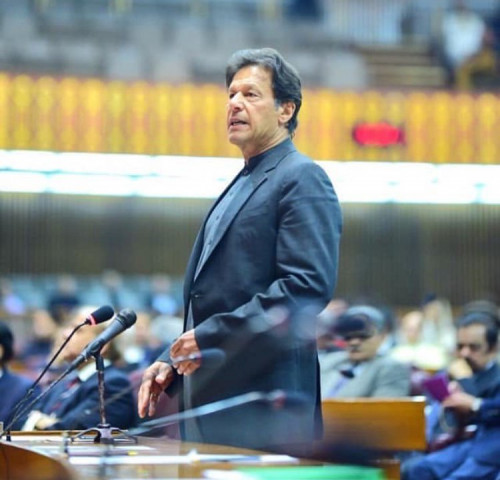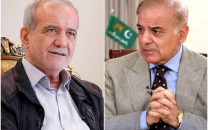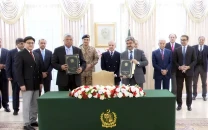PM throws ball in Modi's court
Imran announces release of captured Indian pilot today

PM Imran Khan. PHOTO: PID
Addressing a joint session of parliament, the prime minister warned that the desire for de-escalation should not be construed as weakness and that Pakistan was fully prepared to retaliate against any aggression.
"As a peace gesture we will be releasing him tomorrow," Khan told the joint session, which was convened to discuss the situation after Indian aggression and the violation of Pakistan’s airspace on February 26 and the shooting down of two Indian fighter jets by the Pakistan Air Force on February 27.
The joint session witnessed a rare unity in the wake of tensions between Pakistan and India. The house appeared one and united as it discussed national security. After playing of the national anthem at the outset, the house echoed with slogans in favour of the state and the army.
Trump hints at de-escalation between India, Pakistan as US mediates
In his address, Prime Minister Khan asked India to desist from further escalation of tension and not to even think of a war with Pakistan. He warned India that Pakistan was fully prepared to retaliate against any aggression.
“I want to give a message to India and Prime Minister [Narendra] Modi [do] not push the situation to the brink. I know our armed forces are fully prepared,” he said. “The kind of weapons, we (Pakistan and India) have, no one should even think of a war,” he added.
The prime minister reiterated that Pakistan desired peace and stability in the region as it was essential for the government’s efforts to pull the people out of poverty and attract investment and revealed that he tried to reach out to Modi for the sake of peace in the region.
“Tension is not in the interest of both the countries,” he said. “I tried to talk to Prime Minister Modi yesterday…” Khan added. However, the prime minister maintained that Pakistan’s efforts for de-escalation should not be considered as it weakness. “It should not be taken as a wrong signal.”
Pakistan will release the captured Indian Air Force pilot, Wing Commander Abhi Nandan, "as a peace gesture" to India, Pakistan's Prime Minister Imran Khan said on Thursday, stressing that Pakistan desired peace and stability in the region.
Pakistan to hand over captured IAF pilot to Indian authorities at Wagah Border
Addressing a joint session of parliament, chaired by National Assembly Speaker Asad Qaiser, the prime minister warned that the desire for de-escalation should not be confused as weakness and that Pakistan was fully prepared to retaliate against any aggression.
"As a peace gesture we will be releasing him tomorrow," Khan told the joint session, which was convened to discuss the situation after Indian aggression and the violation of Pakistan's airspace on February 26 and the shooting down of two Indian fighter jets by the Pakistan Air Force (PAF) on February 27.
The joint session witnessed a rare unity in the wake of tensions between Pakistan and India. The house appeared one and united as it discussed national security. After playing of the national anthem at the outset, the house echoed with slogans in favour of the state and the army.
In his address, Prime Minister Khan asked India to desist from further escalation of tension and not to even think of a war with Pakistan. He warned India that Pakistan was fully prepared to retaliate against any aggression.
Social media floods with rumours amid Pakistan, India escalation
"I want to give a message to India and Prime Minister [Narendra] Modi [do] not push the situation to the brink. I know our armed forces are fully prepared," he said. "The kind of weapons, we (Pakistan and India) have, no one should even think of a war," he added.
The prime minister reiterated that Pakistan desired peace and stability in the region as it was essential for the government's efforts to pull the people out of poverty and attract investment. He revealed that he tried to reach out to the Modi for the sake of peace in the region.
"Tension is not in the interest of both the countries. I tried to talk to Prime Minister Modi yesterday…" Khan said. He expressed the hope that the international community would also try to de-escalate the situation and play its role.
US, China urge Pakistan, India to exercise restraint and avoid escalation
The prime minister maintained that Pakistan's efforts for de-escalation should not be considered as its weakness. "It should not be taken as a wrong signal," he said. "We are a dignified nation and will fight for our independence and sovereignty."
Highlighting Kashmir as a major unresolved issue, Khan pointed out that continued atrocities and oppression in Indian-Occupied Kashmir, was giving rise to the an indigenous independence movement in the occupied territory.
"Even those Kashmiri leaders, who were not supportive of the view of Occupied Kashmir's separation from India 20 years back, are now talking of independence from India," the prime minister told the parliamentarians.
"The people of Kashmir cannot be subdued by India through its oppressive tactics," he said. "I ask the people of India… they should think what is the reason behind pushing the people (of Kashmir) to become human bombs?" he said. "It is the oppression and the oppressive tactics that removed the fear of Kashmiris."
Regretting the finger-pointing at Pakistan over terrorist act in Occupied Kashmir and relating it with Islamic radicalism, Khan reminded the world of suicide attacks by Tamil Tigers—who were Hindus—before the 9/11. "It is not the religion, but desperation which took the people to such a situation."
The prime minister said that majority of the people in India did not agree with war-mongering, by their media, which he said had not witnessed what happened in Pakistan over the last decade due to terrorist attacks.
Highlighting the devastation caused by wars, he mentioned Afghanistan, where after 17 years of war the US—most powerful country in the world, was thinking of withdrawing its forces. "No one wants war. Wars do not provide solution to issues.
The prime minister lauded the opposition parties and the whole nation for standing with the government and the armed forces of Pakistan and exhibited the unity after the February 26 Indian aggression.
During the session, the opposition lawmakers supported the government's offer for peace to India to give a clear message to India that Pakistani political leadership was united. In their speeches, they also praised the army and the PAF for ensuring a befitting response to Indian aggression.
Opposition leader in the National Assembly Shahbaz Sharif told the joint sitting that the PAF revived the memories of 1965 war by downing two fighter jets of the enemy. "The brave armed forces have achieved a great victory," he said.
He said it was a sad reality that the region could not see sustainable peace because the issue of Kashmir could not be resolved. Peace, he added, could not be achieved until the Kashmir dispute was resolved. "It is the dialogue table where we can resolve the issues," he said.
He condemned Indian atrocities in occupied Kashmir and stressed that India must give the right to self-determination to the Kashmiris. "Every valley of Kashmir today is seeing freedom fighters like Burhan Wani and Adil Dar due to increasing atrocities of the Indian military," he said.
"If its [Indian] forces continue to turn people blind through pellet guns, if they continue to disgrace Kashmiris and continue to run over their jeeps on the innocent civilians, then the world must be warned that the region will not see sustainable peace."
Sharif, the president of the Pakistan Muslim League-Nawaz (PML-N) offered the opposition's full support for the government on the current situation. "The world will hear the voice of a united parliament and a united Pakistan," he said.
Sharif criticised the Organisation of Islamic Cooperation (OIC) for inviting Indian foreign minister Sushma Swaraj as a guest to its meeting. He urged the government to boycott the OIC meeting if it did not withdraw the invitation to Indian foreign minister.
Peoples Party leader and former prime minister Raja Pervez Ashraf, while addressing the joint session, lauded the army and the air force. "We will give a strong response if anyone tries to violate our airspace," Ashraf said. He urged India to realise that war itself was "a big problem".
Speaking at the session, Ghous Baksh Mehr said that war was not an answer to any issue and that disputes could only be resolved through dialogue. "Modi should accept the talks offer of our prime minister. No one will be safe if war breaks out."
Opposition Leader in the Senate Raja Zafarul Haq also stressed that the nation was united and the performance of the armed forces deserved praise. "The role of the air force is particularly commendable.
The Amir of Jamaat-e-Islami Senator Sirajul Haq said that Kashmir was main issue between the two countries and called for early settlement of the dispute. "We appreciate the prime minister's initiative of releasing the Indian pilot. But the release of the pilot is not an issue … the parliament must come to any solution to the Kashmir issue."
Railways Minister Shaikh Rasheed lauded the government's offer for peace talks but called everyone to remain vigilant for any situation. Maulana Asad Mehmood of the Jamiat Ulema-e-Islam-Fazl (JUI-F), Barrister Saif, Usman Khan Kakar and others also addressed the joint session.
The session will continue on Friday (today). Parliamentary Affairs Minister Ali Muhammad Khan will present a motion against Indian aggression while Foreign Minister Shah Mehmood Qureshi will brief the house about his peace efforts on the diplomatic front.



















COMMENTS
Comments are moderated and generally will be posted if they are on-topic and not abusive.
For more information, please see our Comments FAQ